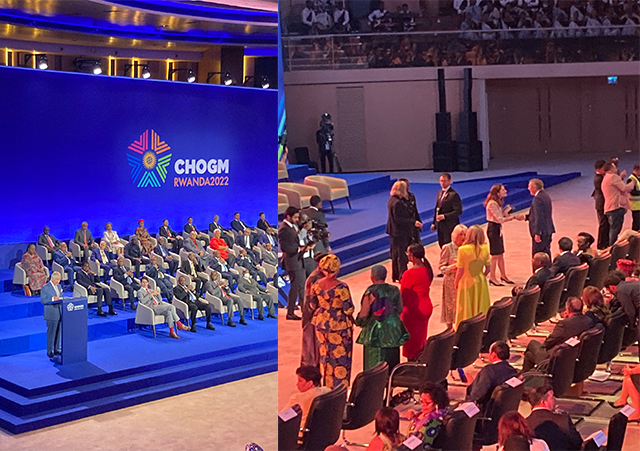
For me the opening ceremony of CHOGM 2022 began early. Up at 6.30am I had to be at the Kigali Convention Centre by 7.45am, my taxi driver, Eric, skilfully circumventing the road blocks and impressing on the assorted AK47-wielding guards, positioned to prevent unwelcome entrants, that I was a bona fide CHOGM media/delegate and was entitled to pass through the barriers. Once into the media centre it was a question of waiting, the Secretariat staff issuing assorted ‘bibs’ depending on which category of media pool we fitted. I was with the ‘writers’ and, with no requirement for a bib, eventually I and my fellow writers took our seats in the circular Convention Centre which, from the outside, looks like a beehive. While we were seated in the gallery, the VIPs and VVIPs were gathering in the main body of the auditorium below in anticipation of the arrival of the VVVIPs, of whom HRH Prince Charles was the last to take his seat representing HM The Queen as Head of the Commonwealth.
Although CHOGM is intended to be ‘Heads of Government’, by no means all those on the stage were prime ministers or presidents. Australia was represented by the deputy prime minister, while New Zealand’s representative was the minister for foreign affairs, as were those of several other countries including South Africa, India, Pakistan, Bangladesh, Malaysia and Sri Lanka. Some had just sent their respective High Commissioners from the UK. The Prime Ministers who were out in force were mainly the ‘small states’ – Tonga, Samoa, Belize, the Bahamas, Mauritius, St Lucia, Antigua and Barbuda – as well as Mozambique, Cameroon, Canada, and of course the United Kingdom. Their presence was complemented by the presidents of the Maldives, Botswana, Ghana, Sierra Leone, Seychelles, Kenya, and of course President Paul Kagame, our host, shortly to become chair-in-office for the next two years. There was one King, Mswati III of eSwanti (the former Swaziland).
The format was simple: four speeches – by President Kagame, the Secretary-General, Prime Minister Johnson and HRH Prince Charles – interspersed by singing and traditional Rwandan dancing. While all the speeches ticked the right boxes in terms of positive comments about the benefits of the Commonwealth, surprisingly perhaps, that of the Prince of Wales seemed to arouse most interest among the press pack, some of whom had made it into the auditorium, others who were watching it live-steamed. Without directly referring to the fact that not one, but two countries (Barbados and now Jamaica) had decided no longer to have the Queen as Head of State, he conceded that each member’s constitutional arrangements – be it as a republic or monarchy – was ‘purely a matter for each country to decide.’ But, he said, while such arrangements can change ‘calmly and without rancour … we should never forget the things which do not change,’ by which he meant the shared values as expressed in the Commonwealth Charter.
Prince Charles then moved on to the most sensitive subject of British colonialism. ‘We must also acknowledge the wrongs which shaped our past. Many of those wrongs belong to an earlier age with different – and, in some ways lesser – values …. I cannot describe the depths of my personal sorrow at the suffering of so many, as I continue to deepen my own understanding of slavery’s enduring impact.’ Given that this was the first time he was addressing the Commonwealth as the Queen’s designated successor, I felt sure that his progressive tone would resonate favourably among fellow member states, albeit not among those who want to see an end to the enduring ‘royal’ leadership of the Commonwealth.
But, throughout the day, there was a strange sub-theme which hung in the air and carried on throughout the Secretary-General’s luncheon, to which I’d happily gained entry, and that was the challenge to the Secretary-General’s tenure by Jamaican minister of foreign affairs, Kamina Johnson Smith, which was being hotly debated. For the first time I saw the ebullient ‘SG’ looking tired, as she conceded in her welcome remarks that the six years she’d spent as Secretary-General had been the ‘greatest honour’ of her life, which seemed like a valedictory statement in case she might not be continuing. (Only later once everyone had departed was it announced that she had been re-elected).
Meanwhile at the luncheon President Kagame was wandering about affably among the guests; in our brief conversation he endorsed my comment that the game changer to all the positive affirmations we’d heard about the Commonwealth was implementation. ‘Yes, implementation,’ he said affirmatively, before we changed topic to talking about my recent visit to the Kigali Genocide Memorial.
So now that the leaders have shared the same platform in the opening ceremony, for the brief period they are together in Rwanda, they will be discussing the multiple crises which we all know the Commonwealth and the world faces, be it climate change, poverty eradication, inequality and development. As with previous CHOGMs we all know that the good intentions and high sounding principles will only be translated into action if the various leaders want them to be. As Kagame departed the luncheon, I heard him say that he would have no compunction, as the new chair-in-office, in telling people what he felt, even if they didn’t like it. With my recent knowledge of Rwandan history, I did not for a moment doubt it.
Next up: Foreign Ministers Roundtable with Civil Society
Victoria Schofield is the chair of the Round Table editorial board.
Related articles:
More in the Kigali Diary series
Is the Commonwealth doing enough to fight human trafficking?



